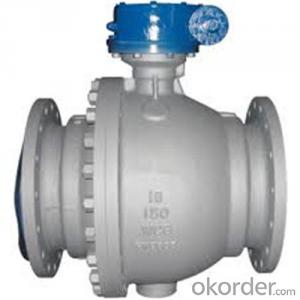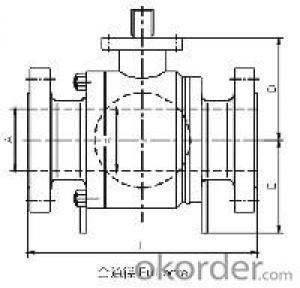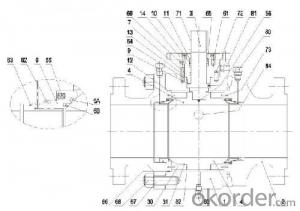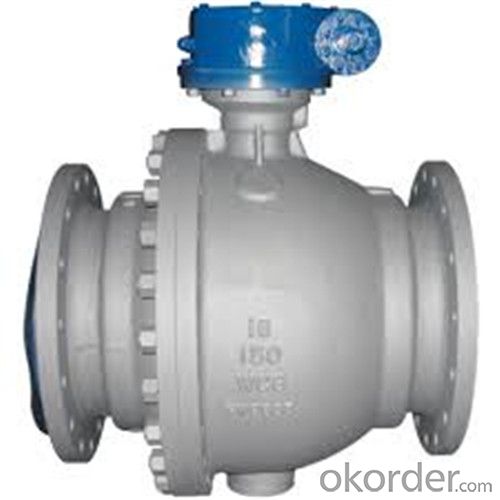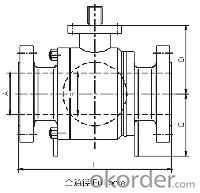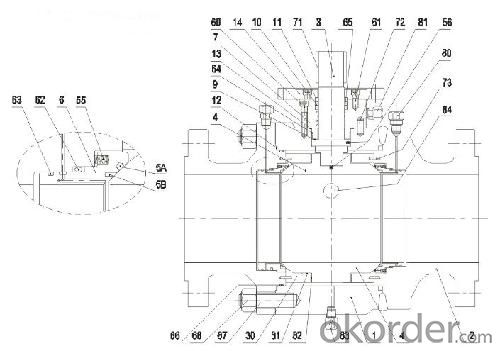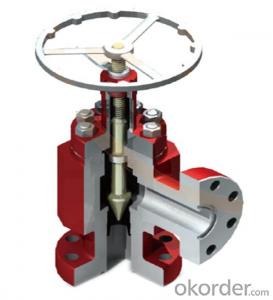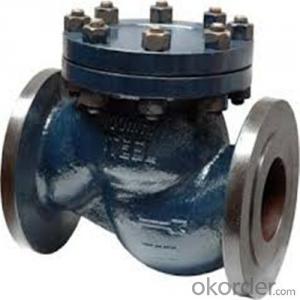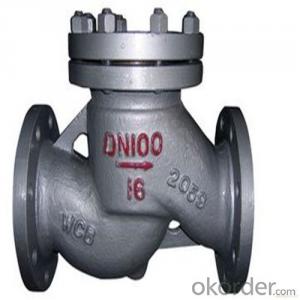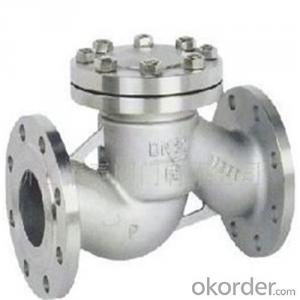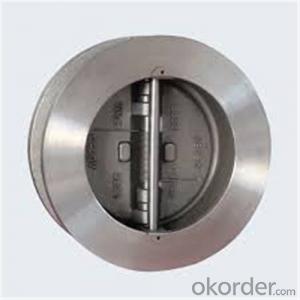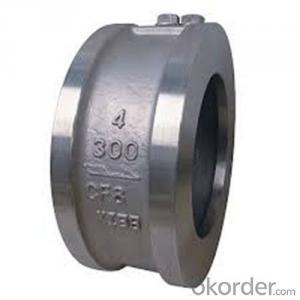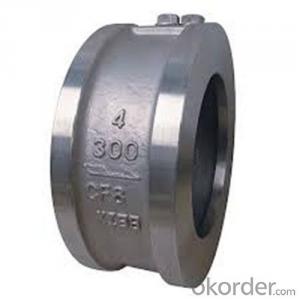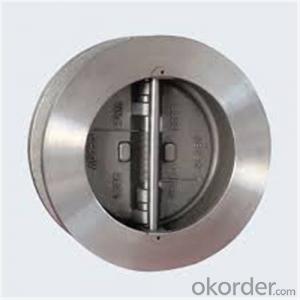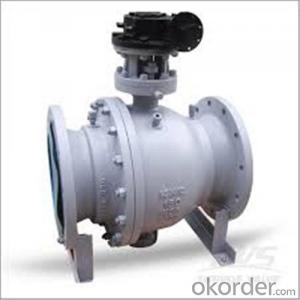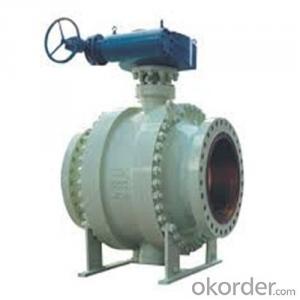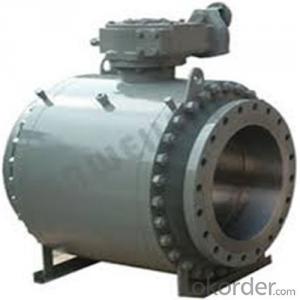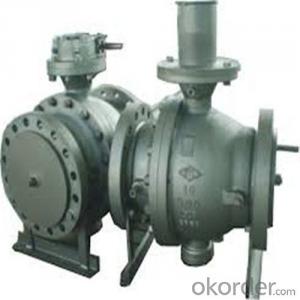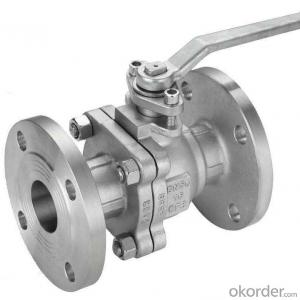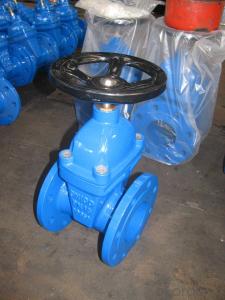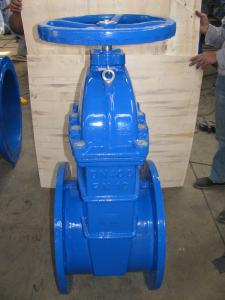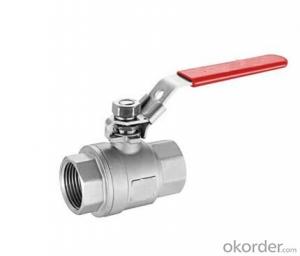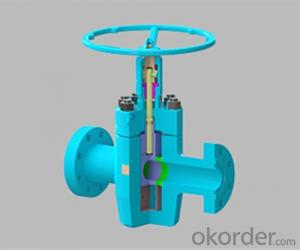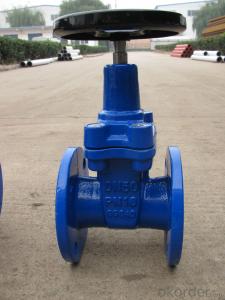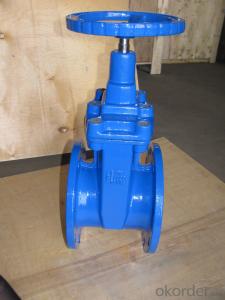High-performace pipeline ball valve 1500 Class
- Loading Port:
- Shanghai
- Payment Terms:
- TT OR LC
- Min Order Qty:
- 10 pc
- Supply Capability:
- 100 pc/month
OKorder Service Pledge
OKorder Financial Service
You Might Also Like
Products Description of pipeline ball valve
Body of high-performance pipeline ball valve is forged structure.The connection type for body and vice-body can be BB(bolted connection)and WB(welded connection).The WB(welded connection)and the LWB(Fully-welded extended stem)structure isadopted for buried ball valves,as shown below.
High performance pipeline ball valve series has the feature of strength,high perfect sealing,maintenance-free,long life and so on.The production of this series ball valve adopts the international advanced ball valve design and manufacturing technology,selects high-quality materials in accordance with the standard selection of materials and combines with advanced materials forming forging technology.At the same time,with the years of ball valve design and manufacturing experience,the use of advanced processing and manufacturing equipment and production and processing technology,through the first-class inspection and testing equipment and instruments,perfect quality assurance management system and excellence in the production of high-performance philosophy can ensure the quality of valves.This series of valve has the performance of a high strength,defect-free forging body,excellent sealing performance,even at maximum pressure difference(full pressure),it will still be able to ensure that seal without leakage,after frequent switching action to realize a safe usage in the transportation of oil,natural gas,coal gas,and other special medium transportation pipeline.
Performance & Dimensions of pipeline ball valve
Standard Criteria | ASME/ANSI/API customize |
Pressure Rating | 1.6 Mpa 2 Mpa 5 Mpa 8 Mpa 10 Mpa 16 Mpa 25 Mpa 42 Mpa |
150 Class 300 Class 600 Class 900 Class 1500 Class 2500 Class customize | |
Valve Size | 50 mm 80 mm 100 mm 150 mm 200 mm 250 mm 300 mm 350 mm 400 mm 450 mm 500 mm 550 mm 600 mm 650 mm 700 mm 750 mm 800 mm 850 mm 900 mm 1000 mm 1050 mm 1200 mm 1400 mm |
2 inch 3 inch 4 inch 6 inch 8 inch 10 inch 12 inch 14 inch 16 inch 18 inch 20 inch 22 inch 24 inch 26 inch 28 inch 30 inch 32 inch 34 inch 36 inch 40 inch 42 inch 48 inch 56 inch customize | |
Actuator | Electric Handle Hydraulic Pilot-hydraulic Pneumatic customize |
Connection | Butt Welding Flange RF Flange RTJ customize |
Medium | Gas customize |
Medium Temperature | -29~150℃ -46~150℃ customize |
Application Fields | Electricity Petrochemical Power Station customize |
Component Materials of pipeline ball valve
1-Body Material | A105 A350-LF2-M customize |
2-Bonnet | A105 A350-LF2-M customize |
3-Stem | 4410+ENP customize |
4-Ball | A350 LF2+ENP A105+ENP customize |
5-Material of Valve Seat | fluorine rubber customize |
5-Seat | Nylon PTFE peek DEVLON customize |
6-Seat ring | A105 ENP+A322 4140 customize |
7-Packing chamber | A322 4140+ENP A105 customize |
9-Stem gasket | RPTFE customize |
10-Packing | graphite PTFE customize |
11-Packing gland | ENP+A350 LF2 ENP+A105 customize |
12-Body gasket | Stainless steel+graphite customize |
13-Gasket | Stainless steel+graphite customize |
14-Top flange | A105 A350 LF2 customize |
30-Supporting board | A105 A350 LF2 customize |
31-Gasket | customize |
55-Seat spring | B637 Inconel X750 customize |
56-Anti-static spring | B637 Inconel X750 customize |
60-Bolt | A320 L7 A193-B7 A193-B7M customize |
61-Bolt | A193-B7 A193-B7M A320 L7 customize |
62-O-ring | fluorine rubber hydrogenated nitrile butadiene rubber customize |
63-Fire-safe ring | flexible graphite customize |
64-O-ring | hydrogenated nitrile butadiene rubber fluorine rubber customize |
65-O-ring | fluorine rubber hydrogenated nitrile butadiene rubber customize |
66-O-ring | fluorine rubber hydrogenated nitrile butadiene rubber customize |
67-Bolt | A193-B7M A320 L7 A193-B7 customize |
68-Nut | A194 2HM A194 4 A194 2H customize |
71-Key | A322 4140 customize |
72-Locating pin | A322 4140 customize |
73-Locating pin | A322 4140 customize |
80-Seat injection valve | WCB+ENP customize |
81-Stem injection valve | WCB+ENP customize |
82-Bearing | PTFE+Stainless steel customize |
83-Drainage valve | Stainless steel customize |
84-Vent valve | Stainless steel customize |
85-Actuator | customize |
90-Plate | Stainless steel customize |
Standards Applied of pipeline ball valve
Design Standard | API 6D customize |
Connection Standard | ASME B 16.25-2007 ASME B 16.5 ASME B 31.4 ASME B 31.8 DIN GB、GB/T JB、JB/T JIS customize |
Test Standard | API 6D customize |
Face to Face | API 6D customize |
Pressure-temperature rating | ASME B 16.34-2004 customize |
Marking | MSS SP-25 customize |
- Q: My fill valve in my toilet is Korky brand and when I take off the cover to the fill valve it shoots water straight up. Is there a way to fix this or do I just have to replace the fill valve.
- Why are you removing the *cover* on the fill valve? That thing was never meant to come off. I hate to say it, but I think you just destroyed your valve. Go buy a new one, they are cheap and unless they went through a redesign since you bought the last one, the seating tube coming into the tank doesn't even need to be changed. Lefty loosey the damaged valve while putting slight pressure in the downward direction and it will pop out. Just install the new one and don't forget the overflow tube connection. Throw the rest of the stuff away, you won't be needing it (if for some reason in the future you do need it you will never find it again anyway).
- Q: so do v-6 engines mean 6 cylinders right?, but what are valves? sometimes they are like double the cylinders (12 valve v6). what do they do, and cars that have like 2.5L does that mean how much fuel is injected and does more mean more power?on a side note, what kind of engine is the evo x? is it 4 cylinder? but has really good technology in it and is that how it has such high bhp?also if anyone knows, i kinda know what torque is but can someone explain in laymen terms? does more=better?
- OK well first, cc stands for cubic centimeters, and they measure the displacement within the cylinder of your engine. Basically, the more cc's the bigger the engine. HP is horsepower and generally the more cc's the more horsepower, altho that is not always true, especially if you turbocharge or supercharge and engine. Also, some manufacturers are able to engineer their engines better than others, thus producing more horsepower out of a smaller (less cc) engine. Finally, valves are like little doors in your cylinder. They open and let in the air and fuel, the engine burns the fuel, and then other ones open and let out the exhaust. Some manufacturers put 2 or 3 or 4 of these doors in each cylinder, with the intention of getting the gas in and exhaust out faster, thus producing more horsepower in some applications. A 16 valve engine will generally be a 4 cylinder engine with 4 valves per cylinder, it is a common engine setup. If you still have questions, wikipedia is your friend.
- Q: I have a mountain bike that my brothers left me. the tire in the front is a normal s valve, the one in the back is a presta valve. now this was ok because it was fully pumped up, but then it popped on the road, so i got a new tire ad put it on and was all ready to pump it up but when i tried to pump it no air would go in. so i looked at it a while and i figured out the top unscrews, so i unscrewed it and put the pump back on and started pumping, but after a while i figured out that no air was going in the tire and now i'm very confused.
- Be careful pumping prestas. If you're not using a pump with a hose, much back and forth movement of the valve stem will cause it to split. In fact, that may have already happened and that's why no air is going in the tube.
- Q: Tryin to figure out how many valves a 1992 vx has. 16 or 8?
- 16 VALVES D15Z1 * VTEC-E * Found in: o 1992-1995 Honda Civic VX o 1992-1995 Honda Civic VEi (European Market) + Displacement : 1493 cm? + Bore and Stroke : 75 mm X 84.5 mm + Rod Length : 137 mm + Compression : 9.3:1 + Power : 92 hp (69 kW) 5600 rpm 97 ft·lbf 4800 rpm + Valvetrain : SOHC VTEC-E (4 valves per cylinder) + Piston Code : P07 + Fuel Control : OBD-1 MPFI
- Q: Is a Head gasket the same thing as the valve cover gasket, on my honda civic si?
- no a head gasket fits betweem the head an the block. the valve cover gasket goes on the cover over the valves or rocker cover are same its sits on the very top of engine
- Q: I have to replace a radiator valve. I have a hot water system, but all I can find are steam valaves in the size I need. Looking at the valve, it looks pretty much the same. It seems like it would work, but it is a Steam valve. Will it work in my hot water system? Why cant I find a Hot water radiator valve over 1?
- Seems to me that a steam valve would need to hold a lot more pressure than a hot water valve. Steam is a high pressure gas and water is a liquid irregardless how hot it is (below boiling point) I am not a qualified plumber or boiler tech but personally I wouldn't use a steam valve for water or vise versa.
- Q: I heard alot about blow off valves making your engine run rich, but I want to get a blow off valve or bypass valve when I get a wrx. (I know some people think they're gay) but i dont care how loud it is, just want that sound. so what's the difference? I've been looking at this one:
- They guy above has some of it. The reason it runs rich is because when the stock by pass valve releases the air back into the intake, it does this after the MAF sensor. Since it is getting a big surge of extra air that the MAF does not read, the ECU automatically increases fuel for a split second when the BPV releases. When you suddenly release all that air into the atmosphere, the computer does not know it and still ups the fuel. That seems like not a big deal but it runs really hot and can do things like foul up plugs and even melt the catalytic converter. There is also the issue with most aftermarket units causing stalling when you first step on the gas or even when sitting still. If you want a little noise, I would first look to getting rid of the intake silencer in the fender. It looks like a milk jug. If that's not enough, then look into an open ended intake. Just be careful with intakes as they also can cause issues depending on the brand and they rear of the car. At least an intake ca be tuned for though. The issues with a BOV can be reduced a little with tuning but can not be eliminated. Sow know that you know the risks and how it does absolutely zero to benefit the car, spend the money on something better.
- Q: My valve cover gasket has less them 2k miles on it and i noticed in some areas there is a lil oil shine around it so i was thinkin maybe i have to retighten the valve cover a lil bit more?
- Valve cover gaskets aren't really affected by miles. They either don't leak or they do. I'd just snug it up a bit. If it still leaks you can put some sealant on the gasket, but only if you can lift it off without wrecking it since you'd have to seal it on both sides. Don't tighten it too much or you will make the leaks worse.
- Q: 1991 Buick Spirit smokes early for five minutes in morning, from exhaust. Tried every carburator and gas cleanative fluid. Mechanic says Valve job'.
- Probably just the valve stem seals need replacing. NOT a entire 'valve job'. The seals help scrape oil off of valve stem to lower the amount of oil weeping into cylinder when engine is running or turned off. As the rubber ages, it cracks and loses its elasticity and doesn't wipe the stem properly. This is a lot cheaper versus a full 3-angle valve job which requires removal of the heads.. Get a second opinion.
- Q: As title.What's an easy way to remember: mitral valve leaflets are anterior and posterior leaflets; tricuspid leaflets are anterior, posterior, and septal (medial); aortic valve leaflets are left, right, posterior leaflets; pulmonary valve leaflets are left, right, anterior leaflets?It's easy to remember all but one valve (mitral) have three leaflets each. Physically aortic root sits behind pulmonary trunk, I guess that makes it easy to remember aortic valve has left, right, Posterior; and that pulmonary valve has left, right, anterior leaflets. Where I'm running out of ideas now is how to remember tricuspid has anterior, posterior and septal leaflets... Please help.Thanks.
- The tricuspid valve has three leaflets which are thin and membranous with commissures that appear more like indentations than true commissures. The TV apparatus is similar to the mitral valve but has greater variability and thinner leaflets. The three leaflets are the anterior, septal and posterior leaflets, with the anterior and septal being larger than the posterior leaflet. TV= tricuspid valve tri-cuspid=3(three leaflets) leaflets=3leaflets Tricuspid: Having three flaps or cusps. The valve that is called the tricuspid valve is situated between the right atrium and right ventricle and permits blood to flow only from the atrium into the ventricle. The aortic valve in the heart also has three cusps. Tricuspid valve (Anat.), the valve, consisting of three triangular membranous flaps, at the opening of the right auricle into the right ventricle in the heart of most mammals; -- sometimes called the tricuspid valves, each flap being regarded as a valve. Take care as always
Send your message to us
High-performace pipeline ball valve 1500 Class
- Loading Port:
- Shanghai
- Payment Terms:
- TT OR LC
- Min Order Qty:
- 10 pc
- Supply Capability:
- 100 pc/month
OKorder Service Pledge
OKorder Financial Service
Similar products
Hot products
Hot Searches
Related keywords
